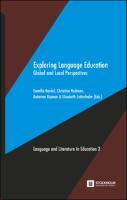Exploring Language Education
Global and Local Perspectives
Contributor(s)
Bardel, Camilla (editor)
Hedman, Christina (editor)
Rejman, Katarina (editor)
Zetterholm, Elisabeth (editor)
Language
EnglishAbstract
The overarching aim of this book is to offer researchers and students insight into some currently discussed issues at the Swedish as well as the international research frontline of Language Education in a selection of up-to-date work. Another aim is to provide teachers, teacher educators and policy-makers with input from research within the interconnected disciplines of Applied Linguistics, Language Education and Second Language Acquisition.
The volume includes five examples of topical research on language education and the authors are internationally renowned scholars. The chapters are based on a selection of talks presented at the 1st ELE Conference (‘Exploring Language Education’), which was held at Stockholm University in 2018. Employing a broad thematic scope, the volume reflects the variety of perspectives on language education brought together at the conference by authors working in diverse areas of the field and in different parts of the world. With the first ELE conference the organizers wished to call attention to the intersection of the global and the local, in terms of linguistic and cultural diversity, which may inform both research questions and language education practices. Issues related to multilingualism, Global Englishes, and experienced tensions between research and practice are examples of generally shared issues that were brought up by many speakers. The chapters of the book represent this variety of themes and illustrate how different regions and communities are contingent on local prerequisites and circumstances, leading to a number of particular challenges and assets when it comes to language education.
The chapters represent different parts of the broad array of research directions that can be discerned under the large umbrella of Language Education, zooming in on the Western context, specifically Sweden, Canada and the United States. Two of the plenary speakers from the conference, Nina Spada and John Levis contribute in the volume. In Spada’s text different ways to bridge the gap between research and practice in language education are discussed, an issue highly relevant to all of those interested in collaborative research between researchers and teachers. The second chapter, written by Levis, presents current research on phonology and the importance of pronunciation in second or foreign language communication.
These two are followed by three chapters reporting on empirical studies. Amanda Brown and colleagues present their work on translanguaging in the English L2 classroom, giving an extensive overview of ideological stances from the last decades on the use of mother tongues vs. target language only in the language classroom.
Liss Kerstin Sylvén reports on a recent study on very young Swedish learners of English, their exposure of English before school age and outside school and the role that this exposure plays for the development of English language proficiency. Finally, Gudrun Erickson and colleagues, present a questionnaire answered by a large number of modern language teachers in Sweden. The study explores the teachers’ answers on questions about their professional satisfaction, their use of the target language in the classroom, and the curricular status of foreign languages studied after English. Despite many critical points raised by these teachers, the survey reveals that they would not change profession, were they given the chance.
The book ends with an Afterword by Stellan Sundh, University of Uppsala.
Keywords
Second language pronunciation; Modern languages; Out-of-school English; Language teachers' practices and perceptions; Language teaching and learning; MultilingualismDOI
10.16993/bbzISBN
9789176351918, 9789176351895, 9789176351901, 9789176351888Publisher
Stockholm University PressPublisher website
https://www.stockholmuniversitypress.se/Publication date and place
2022Grantor
Series
Language and Literature in Education, 2Classification
Language teaching theory and methods
English
For ELT / ESL learning, courses, examinations and certificates
Language teaching and learning
Language readers
Bilingualism and multilingualism
Teaching of a specific subject
Teacher training


 Download
Download Web Shop
Web Shop